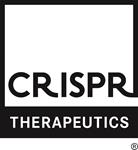Press Release
CRISPR Therapeutics Presents Positive Results from its Phase 1 COBALT™-LYM Trial of CTX130™ in Relapsed or Refractory T Cell Malignancies at the 2022 European Hematology Association (EHA) Congress
-70% overall response rate (ORR) and 30% complete response (CR) rate in peripheral T-cell lymphoma (PTCL) and cutaneous T cell lymphoma (CTCL) at Dose Level 3 (DL3) and above; clinical benefit for 90% of patients-
-Well tolerated safety profile across all dose levels with no DLTs observed-
“We are very pleased with the preliminary results from our COBALT-LYM trial, which showed efficacy and safety that suggest that CTX130, the first allogeneic CAR-T directed against the novel target CD70, can produce deep responses in patients with relapsed or refractory T cell lymphomas,” said
“While overall survival in a subset of patients with T cell lymphoma has improved with front-line combination chemotherapy, relapsed or refractory patients continue to have very limited treatment options,” said
COBALT-LYM Trial Overview
The Phase 1 COBALT-LYM trial is an open-label, multicenter clinical trial evaluating the safety and efficacy of CTX130 in adult patients with relapsed or refractory T or B cell malignancies. Dose escalation of CTX130 was performed in adult patients with relapsed or refractory T cell lymphoma, with at least 10% expression of CD70. Patients who received prior treatment with any CD70 targeting agents were not eligible.
Patients received three days of lymphodepleting chemotherapy, consisting of fludarabine at 30 mg/m2/day and cyclophosphamide at 500 mg/m2/day, followed by a single CTX130 infusion. Patients completed screening in as few as five days, and the median time from enrollment to the start of lymphodepleting chemotherapy was only three days. This timeline was possible because there is no need for leukapheresis or bridging chemotherapy, and CTX130 is available at the site before a patient is enrolled. Additionally, patients who showed clinical benefit from the first CTX130 infusion could be re-dosed following disease progression.
As of the
The primary endpoints include safety as measured by the incidence of dose limiting toxicities (DLTs) and overall response rate (ORR). Key secondary endpoints include progression free survival (PFS) and overall survival (OS).
Safety
CTX130 was well tolerated across all dose levels. The adverse events of interest for all evaluable patients are shown in the table below.
- There were no cases of Graft versus Host Disease (GvHD); no dose limiting toxicities (DLTs); and no instances of tumor lysis syndrome (TLS).
- All cases of cytokine release syndrome (CRS) and immune effector cell-associated neurotoxicity syndrome (ICANS) were Grade 1 or 2 per the
American Society for Transplantation andCellular Therapy (ASTCT) criteria and either required no specific intervention or resolved following standard CRS management. Neither the frequency nor severity of CRS has increased in patients who were re-dosed with CTX130.
- There was a sudden death in one patient with William’s syndrome in the context of a lung infection, deemed unrelated to CTX130. There were no treatment related deaths in the trial. Overall, CTX130 has an emerging safety profile that is well tolerated.
Adverse Events of Interest, N (%)
| DL1 3x107 N=4 |
DL2 1x108 N=4 |
DL3 3x108 N=5 |
DL4 9x108 N=5 |
DL≥3 N=10 |
||||||
Gr 1-2 |
Gr ≥3 | Gr 1-2 | Gr ≥3 | Gr 1-2 | Gr ≥3 | Gr 1-2 | Gr ≥3 | Gr 1-2 | Gr ≥3 | |
| CRS | 1 (25) |
- | 1 (25) | - | 4 (80) | - | 4 (80) | - | 8 (80) | - |
| ICANS | - | - | - | - | 3 (60) |
- | - | - | 3 (30) |
- |
| GvHD | - | - | - | - | - | - | - | - | - | - |
| Infections | 2 (50) |
1 (25) | - | 1 (25) | 2 (40) | 1 (20) | 1 (20) | 1 (20) | 3 (30) | 2 (20) |
*All events listed in table are treatment-emergent adverse events
Clinical Activity
Deep responses were seen with CTX130 in a significant fraction of patients at DL3 and above. Data are shown below for the 18 patients who received CTX130 and had at least 28 days of follow-up. Disease assessment was performed by investigator review according to the 2014 Lugano Response Criteria for PTCL or the
Best overall response, N (%)
| PTCL | CTCL | ||||||||||
| Cell dose (CAR+ T cells) |
DL1 3x107 N=4 |
DL2 1x108 N=4 |
DL3 3x108 N=5 |
DL4 9x108 N=5 |
DL≥3 N=10 |
DL≥3 N=5 |
Total N=8 |
DL≥3 N=5 |
Total N=10 |
||
| Overall Response Rate (ORR) | 2 (50) | 0 | 3 (60) | 4 (80) | 7 (70) | ORR | 4 (80) | 5 (63) | 3 (60) | 4 (40) |
|
| CR | 1 (25) | 0 | 2 (40)* | 1 (20) | 3 (30) | CR | 2 (40) | 3 (38) | 1 (20) | 1 (10) | |
| PR | 1 (25) | 0 | 1 (20) | 3 (60) | 4 (40) | PR | 2 (40) | 2 (25) | 2 (40) | 3 (30) | |
| Disease Control Rate (DCR = CR + PR + SD) |
3 (75) | 1 (25) | 5 (100) | 4 (80) | 9 (90) | DCR | 4 (80) | 5 (63) | 5 (100) | 8 (80) |
|
*One patient in DL3 who initially achieved a PR was re-infused at DL4 following a change to SD and achieved a CR at DL4.
- Patients were heavily pre-treated with a median of four systemic therapies prior to enrollment in the study. None of the 18 patients had achieved a complete response (CR) in their previous line of therapy.
- Median CD70 expression among the patients was 90%. Responses were observed across all levels of CD70 expression.
- Clinically meaningful responses were observed with CTX130 with a higher percentage of patients responding at higher dose levels. At DL3 and above, ORR was 70% with 30% of patients achieving a CR. In addition, 90% of patients at DL3+ had clinical benefit defined as a stable disease or better response. These responses were largely consistent in both PTCL and CTCL with ORRs of 80% and 60%, respectively, at DL3+.
- Broad activity and deep responses were seen in all disease compartments including lymph nodes, skin and blood in patients with CTCL following treatment with CTX130.
These preliminary data demonstrate that CTX130 has the potential to provide meaningful clinical benefit with a well-tolerated safety profile. Given the inherent difficulties and potential risks of manufacturing a CAR-T therapy from a patient’s own diseased T cells, allogeneic cellular therapy approaches for T cell lymphoma have greater potential to address the unmet need in this patient population.
CTX130 is currently being investigated in two ongoing Phase 1 clinical trials for the treatment of various subtypes of lymphoma (COBALT-LYM) or relapsed or refractory renal cell carcinoma (COBALT-RCC), respectively. Additional details on COBALT-LYM may be found at clinicaltrials.gov, using identifier: NCT04502446. In parallel, the Company continues to advance the rest of its immuno-oncology portfolio.
The Company plans to recap this data during the CRISPR Therapeutics Innovation Day, an event focused on early research and development, on
Innovation Day Webcast
A live webcast of the event will be available on the "Events & Presentations" page in the Investors section of the Company's website at https://crisprtx.gcs-web.com/events. A replay of the webcast will be archived on the Company's website for 30 days following the presentation. Please contact crisprtx@argotpartners.com for any questions regarding the event.
About CTX130
CTX130, a wholly-owned program of
About COBALT-LYM
The ongoing Phase 1 single-arm, multi-center, open label clinical trial, COBALT-LYM, is designed to assess the safety and efficacy of several dose levels of CTX130 for the treatment of relapsed or refractory T- or B-cell malignancies.
About COBALT-RCC
The ongoing Phase 1 single-arm, multi-center, open label clinical trial, COBALT-RCC, is designed to assess the safety and efficacy of several dose levels of CTX130 for the treatment of relapsed or refractory Renal Cell Carcinoma.
About
CRISPR Forward-Looking Statement
This press release may contain a number of “forward-looking statements” within the meaning of the Private Securities Litigation Reform Act of 1995, as amended, including statements made by Dr.
Investor Contact:
+1-617-307-7503
susan.kim@crisprtx.com
Media Contact:
+1-617-315-4167
rachel.eides@crisprtx.com

Source: CRISPR Therapeutics AG


